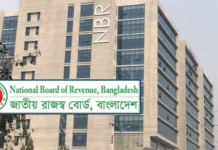Bangladesh went up 28 notches in the anti-money laundering and counter terrorist financing (AML/CTF) index of the Basel Institute on Governance — a development that will come as a pat on the back for the government.
The country came in at No. 82 out of 146 in the 2017 edition of the Basel AML Index, up from its previous spot of 54.
A total of 14 indicators dealing with AML/CTF regulations, corruption, financial standards, political disclosure and the rule of law are aggregated into one overall risk score for the index.
The Switzerland-based institute prepares score on the basis of a scale of 0 to 10, with 0 to 3.3 being low-risk, 3.3 to 6.6 medium-risk and 6.6 to 10 high-risk.
Bangladesh’s score this year was 5.79, down from its last year score of 6.40.
As per the score, Bangladesh is among the 100 medium-risk countries, including India that managed a score of 5.58. Neighbouring Pakistan, Sri Lanka, Nepal, Myanmar and even Thailand fall in the high-risk category.
In South Asia, only India ranked ahead of Bangladesh: 88. Pakistan ranked 46, Sri Lanka 25, Nepal 14, Myanmar 13 and Afghanistan 2.
The report said Bangladesh saw a big jump in its ranking due to the results of the Financial Action Task Force (FATF) Mutual Evaluation Report in October 2016.
In fact, Bangladesh is one of the 10 countries that made the most progress — China, Israel, Germany, France, Australia, Luxemburg, Latvia, Greece and Sudan.
According to the FATF report, Bangladesh has made significant progress since its last evaluation report in 2009, reflecting political commitment and leadership on AML/CTF.
The positive changes were seen in developing preventive measures for the financial sector and applying significant resources to raise awareness of AML/CTF, it said.
Bangladesh Bank in a statement yesterday said the country implemented all 40 of the Asia/Pacific Group on Money Laundering’s recommendations.
The country managed full compliance in six categories, near full compliance in 22 and partial compliance in 12.
The Basel AML Index seeks to provide an overall picture of a country’s risk level and to serve as a solid starting point for examining progress over time.
According to the report, the top 10 high-risk countries are: Iran, Afghanistan, Guinea-Bissau, Tajikistan, Laos, Mozambique, Mali, Uganda, Cambodia and Tanzania.
The top 10 low-risk countries are: Finland, Lithuania, Estonia, Bulgaria, New Zealand, Slovenia, Denmark, Croatia, Sweden and Israel. The Basel Institute on Governance has been releasing the report since 2012.
Source: The Daily Star









